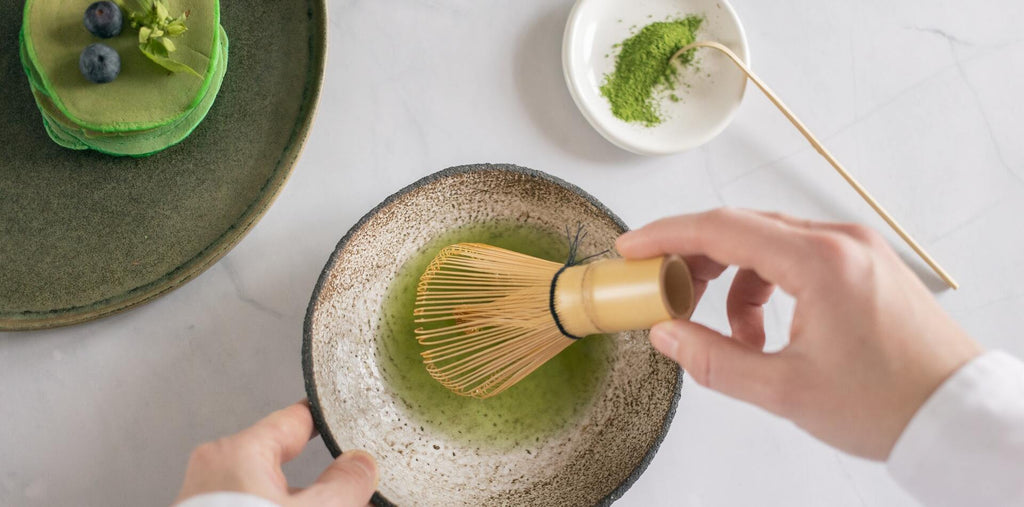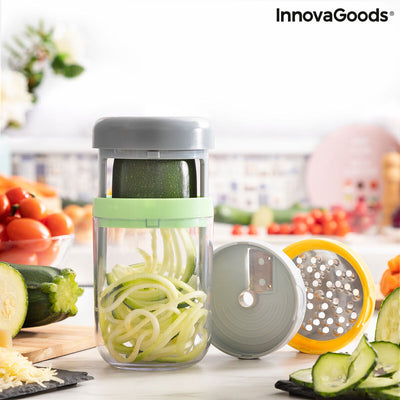Matcha Benefits: Potent Antioxidant & Brain-boosting Superfood
For many people, matcha appears like something “trendy” - a drink for fashion bloggers or healthy lifestyle seekers. So just by hearing “matcha latte with plant-based milk” you may already imagine something unfairly popular - and definitely not healthy. However, statistics may argue with you - Grand View research found that the global matcha market has reached $1.63 billion in 2018. So we can be sure that’s not just a trend but an integral part of most people's diets.
But how drinking matcha latte may help you? And does it actually work as an antioxidant? In our article, we’re going to discover how matcha works and which benefits it may bring to your health. So dive in and you’ll never think again that matcha is just a trend!

What is matcha?
Actually, matcha is a type of green tea but a bit different compared to the tea we’re all used to. It’s harvested earlier when the tea leaves are young and fresh and then blended into a powder. This specific harvest process helps preserve more nutrients and antioxidants in the blend, making it more potent than regular green tea. Then you can use matcha powder as a standalone drink mix, just adding hot water or milk, or use it as an ingredient for desserts, coffee drinks, or cocktails.
How does matcha differ from regular green tea?
Even though both matcha and green tea come from tea leaves, they have different nutrient content. When growing raw materials for matcha production, manufacturers cover tea leaves in the shade to protect them from oxidation and preserve more antioxidants. Regular green teas come through many manufacturing processes, including boiling, heating, or drying. Meanwhile, green tea leaves lose many nutrients and become less beneficial for your health.
Also, green tea and matcha are different in the way you consume them. Tea needs to be brewed - the resulting product is a diluted infusion of tea leaves, with a very slight effect on your health. Matcha is a blend of these tea leaves which you consume orally. That way of consumption helps you get more antioxidants and nutrients.

The third difference is in the taste of matcha and green tea - the first one has a stronger, grassy flavor, while tea is refreshing and has a light texture. That’s why you may drink a few cups of tea in a row, while just one cup of matcha will be enough to pamper your tastebuds.
Now it’s clear that matcha isn’t the type of green tea - it’s a separate drink with several unique perks for your brain productivity & health. Let’s figure out then how adding matcha to your diet may help you!
Benefits of matcha drinks for your health & productivity
You’d be surprised, but this “trendy drink” sometimes is even more beneficial than certain supplement pills. Starting from brain-boosting effects to heart support, matcha could be a solution your health craves.
Matcha is a rich source of caffeine
Can’t live without the caffeine shot to start your day or power up during a long workday? Then matcha could be a powerful coffee replacement in your diet! A study claims that just one teaspoon of matcha powder contains around 64 mg of caffeine. In comparison, the same amount of green tea contains only 24 mg of caffeine, while an espresso shot has 77 mg of it.
Meanwhile, caffeine is a stimulant that can make your brain work better and you feel more alert. Studies have found that caffeine can increase the speed of your mental response and improve short-term memory by 34%. Caffeine also helps boost your mood and reduce feelings of sleepiness in just two or three hours after consumption.

This stimulant may keep you awake during a long-haul flight, or help you stay focused when slogging through a boring meeting. You may even find yourself completing tasks more quickly with fewer errors because the caffeine helps you focus and maintain sustained attention. So consuming matcha would be an outstanding solution if you want to get loaded with brain-boosting caffeine.
Matcha bursts with antioxidants
Among all-natural nutrients, matcha is a total win-win solution for those who want to boost antioxidant intake. Researchers have found that it contains a high content of catechin polyphenols, which are antioxidants that may reduce oxidative damage (free radicals) in the body. These free radicals could destroy your brain cells & cause excessive tiredness in your body, making you sluggish and sleepy.
Antioxidants in matcha may also be a potent support to your heart health. High catechin content allows matcha to be a possible effective solution for reducing bad cholesterol levels and maintaining the normal level of healthy lipids in your blood. It’s essential to keep your heart healthy and possibly avoid many heart issues.
Matcha also contains flavonoids like rutin, which acts as a potent antioxidant. According to scientists, consuming rutin may help strengthen your immune protection and reduce inflammation in your body. Plus, rutin could slow down the oxidation of vitamin C, helping it act more efficiently in your body. If you’re still not sure whether you should opt for green tea or matcha, we have a hint for you - a study claims matcha has 137 times more antioxidants than low-grade green tea.
Matcha contains amino acids, beneficial for stress relief and mood boost
Another perk of matcha is that it’s a real powerhouse of amino acids. Though, this blend is especially rich in theanine and arginine, which play a role in your mood regulation and stress relief. Study claims that in combination with caffeine, these two amino acids may improve your stress resistance, reduce anxiety, and stay calm during tense times.

Meanwhile, matcha could also act as a mood enhancer because of the high phytochemicals content. It may help you cope with emotions and supply your brain with the nutrients that help produce mood-boosting hormones like serotonin. So if you were looking for a natural solution to feel better and stay balanced, then it’s time to try matcha!
Matcha may improve your brain performance
Surprisingly, matcha could be your powerful ally for leveling up your brain performance and work productivity. Studies show that matcha drinkers perform better on mental tasks than those who don't drink it. The L-theanine content in matcha binds to the amino acid glutamine and increases productivity. Antioxidants in matcha may also strengthen your memory by protecting your brain cells from destruction.
Also, L-theanine in matcha may help you boost focus during complex tasks, possibly allowing you to finish your projects with better results. So if you find yourself dizzy at the workplace or struggle to concentrate, opt for matcha instead of a sugary coffee drink.
Matcha could help strengthen your bones
The lack of antioxidants is among the reasons why your bones could be weak and break easily. That’s why it’s essential to support them with particular natural supplements, and matcha could be one of them. Scientists have found that matcha includes organic chemicals - polyphenols, which may act as antioxidants and increase your bone density. Plus, they may reduce inflammation and help keep your bone healthy.

Matcha may contribute to your skin health
Your skin, just like any other part of your body, needs various nutrients to stay healthy and look good. But when most skin treatments like creams, lotion, and serums don't show a significant effect, you may start supporting your skin from the inside.
In this case, matcha could be of much help to you since it’s a rich natural source of vitamins. Vitamin C in it could allow your body to produce more collagen to improve skin smoothness and elasticity. Besides, matcha also includes vitamin B, possibly beneficial for improving skin cell metabolism and recovery.
So it’s clear that matcha is a true superfood that may benefit your energy levels, skin health, and even boost your productivity. Now let’s figure out how to choose matcha powder that will cover all your health needs.
How to choose a matcha drink to support your health?
Just like you can find tons of poor-quality green tea options which have minor health benefits, it could also be hard to pick the right matcha which has good taste & nutrient content. So you should know a few things before choosing matcha for yourself.

- Carefully watch the origin. You can find many matcha options made in China where it was originally invented. Though, consider Japan as the best origin for matcha production. Japanese manufacturers grow tea leaves for matcha solely in the shade and pick the finest quality leaves for the blend. Chinese matcha has a higher chance of being of low quality.
- Look for a smooth texture. High-quality matcha always has a smooth, dusty-like texture. That means it was stone grounded to better mix with water and create a creamy taste. If the matcha has bigger particles, that means it won’t mix with water and could taste like sand. So opt for smooth matcha powder if you want to enjoy your drink.
- Check the taste and smell. Another marker for high-quality matcha is grassy & fresh taste with no bitterness. The blend should taste like concentrated green tea with a slightly sweet aftertaste. If the matcha has a bitter taste or some additives which interfere with green tea flavor, then it may be a poor quality option.
- Verify the matcha’s color. The main reason matcha is grown in shady places is to preserve more chlorophylls in it, which helps deliver a potent antioxidant effect. That means the best quality matcha should have a juicy & bright green color. The yellow, dark green, or brown color of matcha shows it has poor quality.
Keep in mind that by choosing a low-quality, cheap matcha option you won’t get the nutrients you crave and may also damage your health. Matcha which doesn’t meet basic could be toxic and cause side effects. So try to stick to our advice and never choose the cheapest options since they have a high chance of being low-quality.
Tips for consuming matcha in the most effective way
If you have never tried matcha, you may be curious about how to use this “green powder” in the most effective way. We’ve got you covered - take a look at these tips to serve matcha as a pro!

- Prepare matcha as a hot coffee drink. One of the best ways to consume matcha is to prepare a creamy matcha latte. Just add one tbsp of matcha powder to the mug, pour some hot water, and whisk until the powder dissolves. Then you can add frothed milk and some sugar to complete your perfect latte.
- Use matcha to create an antioxidant-rich salt. Matcha also works well as a taste enhancer, so you can mix a few pinches of it into one tbsp of sea salt, then add this mix to salads, toasts, and garnishes.
- Add matcha to your desserts. Matcha could be a perfect addition to ice cream or a frozen dessert. When preparing them, just add a few teaspoons of matcha powder to the mix, and as a result, you’ll get an antioxidant-rich yummy treat to pamper your tastebuds.
- Don’t drink matcha before bed. Since this green powder has high caffeine content, avoid consuming it before bedtime - otherwise, it may make you too energized and disrupt melatonin production. The best time for consuming matcha is in the morning when you need to tune in for a productive day and in the midday when you feel drowsy.
- Stick to the recommended dosage. High polyphenols content makes matcha a potent superfood. Still, consuming over two cups of matcha per day may cause vomiting and nausea, so it’s better not to overdose on it. You can replace the extra matcha cup with simple green tea to avoid potential side effects.
- Make matcha smoothies. Another way of consuming matcha is to mix it into the smoothie. It will be especially delicious with banana, kiwi, or strawberry smoothie, so you’ll not just get the benefits of fresh fruits but also a boost of superfood.
Now you have plenty of reasons to add matcha to your diet and are ready to choose the best quality options! So you may try some ways of preparing it we’ve suggested and see the effects on your health.
Resources:
- Matcha Market Size, Share & Trends Analysis Report By Grade (2014)
- Matcha Tea (2022)
- The Effects Of Caffeine On Short Term Memory (2014)
- Beneficial Properties Of Green Tea Catechins (2020)
- Green Tea Catechins And Cardiovascular Health: An Update (2008)
- Antioxidant Properties And Nutritional Composition Of Matcha Green Tea (2020)
- Stress-Reducing Function Of Matcha Green Tea In Animal Experiments and Clinical Trials (2018)
- Effect Of Green Tea Phytochemicals On Mood And Cognition (2017)
- Effects Of Matcha Green Tea Powder On Cognitive Functions Of Community-Dwelling Elderly Individuals (2020)








